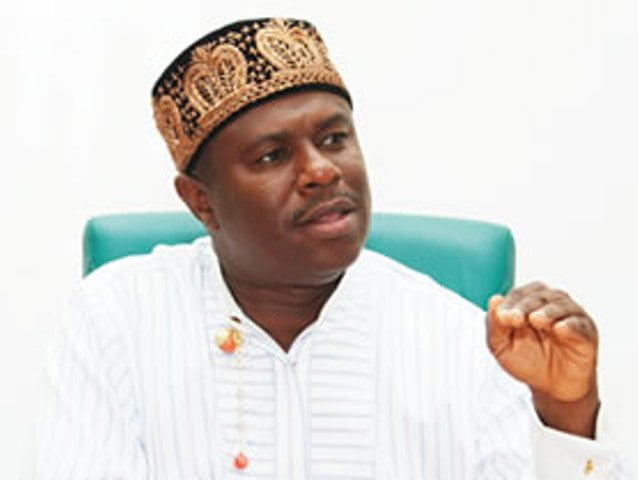
Tensions between Nigeria’s central and state governments have long been the fault lines of its federal system; it is like a simmering struggle between authority and autonomy. The 1999 Constitution, though intended as a compass for governance, is riddled with ambiguities—grey areas that have, time and again, become battlegrounds for political and legal duels. Among the most contentious debates is the reach of Section 305(1), which grants the president the power to declare a state of emergency. But does this mandate extend to the unilateral removal of democratically elected state officials?
For years, this question has lingered like an unspoken riddle in the corridors of power, whispered in legal chambers and political gatherings alike. Now, it erupts into the open, thrust into the unforgiving glare of the Supreme Court by seven opposition governors of the Peoples Democratic Party, PDP. Their challenge is more than a legal contest; it is a reckoning—one that may redraw the contours of Nigeria’s federalism, recalibrate executive authority, and probe the very essence of democracy in the nation.
The Supreme Court, under Section 232(1) of the 1999 Constitution, has original jurisdiction in disputes between the Federal Government and state governments. This means it can directly adjudicate conflicts concerning constitutional interpretation. The ongoing case will test the limits of this jurisdiction, mainly whether the Supreme Court can provide clarification in the absence of a specific dispute between a state and the Federal Government.
If the Court rules that interpretation alone is insufficient to activate its jurisdiction, it could set a precedent discouraging proactive legal resolutions, potentially allowing constitutional ambiguities to persist until conflicts escalate. However, if the Court determines that a general ambiguity affecting multiple states warrants judicial intervention, it will pave the way for a more dynamic constitutional review process that ensures legal clarity before crises arise.
Section 305 of the Constitution grants the president the power to declare a state of emergency, but the criteria remain broad and open to interpretation. Key questions include: What constitutes a “clear and present danger” to justify an emergency declaration? Should there be legislative oversight beyond the National Assembly’s approval? How does Nigeria’s standard compare to international best practices? The governors argue that the Supreme Court should establish precise conditions under which emergency powers can be invoked. The governors want the Supreme Court to define what circumstances justify a state of emergency.
A critical aspect of this case is whether the president’s emergency powers extend to suspending or removing elected state officials. The governors contend that the Constitution does not grant such authority. Their argument is grounded in Section 1(2), which establishes Nigeria as a democracy where sovereignty belongs to the people; Section 5(2), which limits executive powers by constitutional provisions; and Section 305, which does not explicitly provide for the removal of elected officials.
The Supreme Court’s ruling will set a precedent for the extent of presidential authority during emergencies. It will either reaffirm state autonomy or expand federal executive powers, shaping the balance of power in Nigerian governance. Many legal scholars have argued that the power to remove a democratically elected governor lies with the electorate and, in extreme cases, the legislature—not the president.
The Constitution mandates a two-thirds majority vote in each chamber of the National Assembly to approve a state of emergency. The governors question whether the voice vote method used in recent emergency approvals met this requirement. The Court’s decision will determine whether procedural irregularities can invalidate emergency rule declarations. If the Supreme Court rules that a voice vote is insufficient, it could impose stricter legislative oversight on emergency declarations, ensuring greater accountability and preventing unilateral executive actions from circumventing constitutional processes.
Regardless of the outcome, this case highlights the importance of legal challenges in refining Nigeria’s constitutional framework. Nigeria’s judiciary is responsible for addressing constitutional ambiguities to prevent future conflicts. The Supreme Court had a previous opportunity to clarify constitutional provisions regarding local government elections in Rivers State and more specifically the place of the Electoral Act 2022.
However, the ruling did not address critical ambiguities, leaving unresolved questions in electoral jurisprudence. The current case presents another chance for the Court to provide much-needed legal clarity. The judiciary plays a crucial role in resolving ambiguities that could otherwise lead to executive overreach or political instability.
If the Court delivers a well-reasoned judgement, it could serve as a touchstone for future constitutional conflicts, reinforcing the judiciary’s role in shaping Nigeria’s democratic evolution.
This case will establish whether the president’s emergency powers include suspending elected officials. A ruling in favour of the governors could reinforce state autonomy while limiting federal intervention in state affairs. Conversely, a ruling in favour of the president could expand executive powers, setting a precedent for future emergency rule declarations.
This case could prompt the National Assembly to carry out constitutional amendment to review the discretionary powers granted to the president. Potential reforms could include defining emergency conditions more precisely, requiring judicial review of emergency declarations, and strengthening legislative oversight to prevent executive overreach.
The Supreme Court’s decision will be a defining moment for Nigeria’s constitutional democracy. If it upholds the governors’ argument, it will set a strong precedent affirming the independence of state governments, ensuring that executive powers remain within constitutional limits. If it rules in favour of expansive presidential authority, it risks tilting the balance of power.
Whatever the outcome, this case has forced a crucial legal reckoning, compelling Nigeria to confront the ambiguities in its constitutional framework. The judiciary must rise above partisanship, deliver a judgment that reinforces the rule of law, and safeguard Nigeria’s democratic evolution. A well-reasoned ruling will not only settle the immediate dispute but will shape the nation’s legal and political trajectory for generations to come.
The post Governors, federalism and constitutional tension, by Dakuku Peterside appeared first on Vanguard News.








